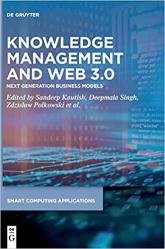Knowledge Management and Web 3.0: Next Generation Business Models
- Добавил: literator
- Дата: 15-12-2021, 16:42
- Комментариев: 0
 Название: Knowledge Management and Web 3.0: Next Generation Business Models
Название: Knowledge Management and Web 3.0: Next Generation Business ModelsАвтор: Sandeep Kautish, Deepamala Singh, ZdzIslaw Polkowski
Издательство: De Gruyter
Серия: De Gruyter Series on Smart Computing Applications
Год: 2022
Страниц: 214
Язык: английский
Формат: pdf (true), epub
Размер: 42.3 MB
Today, it is understood that more data is streaming into organizations from more sources than ever before. But only collecting and storing the data is not enough for every organization, it is important to put them in usable form so that they may get easily accessible whenever they are needed. This overburden of information produced new technologies in many forms. In these new technologies knowledge management and Web 3.0 are also used as a tool for the better use of the data in the productivity of the organization. This book will discuss that how integration of new emerging technology, that is, Web 3.0 in knowledge management can impact the working of an organization along with that the book also explains the evolution and overview of knowledge management and Web 3.0, the future, challenges, and the significance of the same.
With the speedy growth of Internet, knowledge has been increasing rampantly year by year. The convenience and approachability of Internet and the popularity of computer have produced a major change in the passion and way of using the information, the popularization of using computer has given a massive transformation from traditional web pages Web 1.0 to a new emerging internet model, which is based on ample content and collaboration known as Web 3.0. The contributions of this book investigate the applications of Knowledge Management in the upcoming era of Semantic Web, or Web 3.0, and the opportunities for reshaping and redesigning business strategies for more effective outcomes.
When users search the information on Web 1.0 and Web 2.0, then the system was searching and presenting the information via using the keywords which were searched by the user. However, this outline has changed after the launch of Web 3.0. With the launch of this technology, the machine learning was also included in Web 3.0 which is widely popular as Artificial Intelligence (AI). Web 3.0 was the semantic web which was combined with read-write-execute the information by the user, where computers and servers can interpret the searched information like humans with AI and Machine Learning (ML) methods. In this system, the algorithm of the programs was specially designed to create communication between machines to the machine. This is the third-generation technology in the field of the World Wide Web which was launched in 2006 by creating this technology with semantic web data integration. Web 3.0 is using the technology with metadata, where it converts the display only data to meaningful information which helps the users to evaluate their searches. The semantic Web 3.0 is the read-write intelligent web feature that is developed by the smart applications to provide users with highly portable and individual-oriented data with next-generation browsing and information searching capabilities while searching for content. This system was executable semantic-based which used the AI and multi-user virtual environment to provide users a better experience when it compared with Web 2.0 which was only based on reading and writing program with online social networks platforms. This feature enables the internet program to help this system to rethink themselves and generate the results rather than humans
Скачать Knowledge Management and Web 3.0: Next Generation Business Models
[related-news] [/related-news]
Внимание
Уважаемый посетитель, Вы зашли на сайт как незарегистрированный пользователь.
Мы рекомендуем Вам зарегистрироваться либо войти на сайт под своим именем.
Уважаемый посетитель, Вы зашли на сайт как незарегистрированный пользователь.
Мы рекомендуем Вам зарегистрироваться либо войти на сайт под своим именем.
